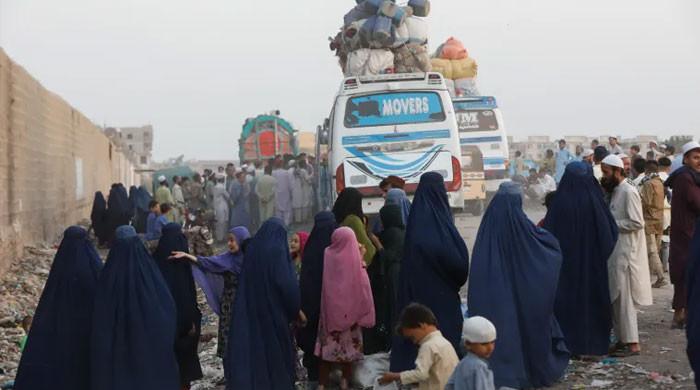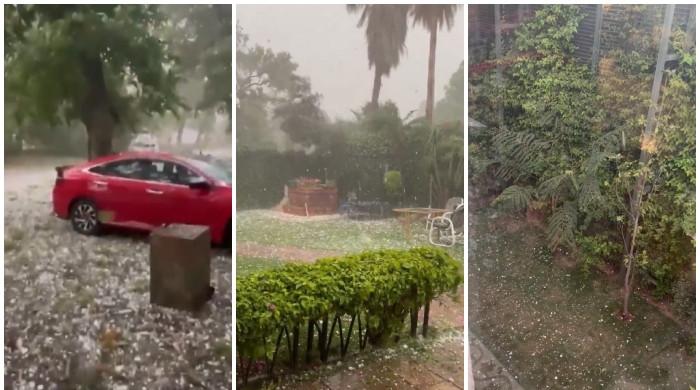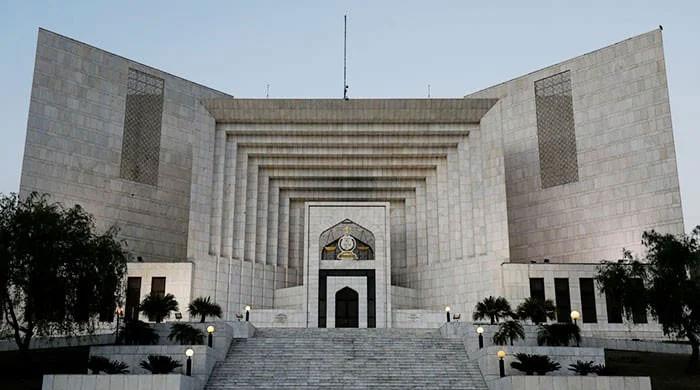Budget 2021-22: Government targets 4.8% growth in 'people-friendly' budget
Opposition puts up stiff resistance during budget speech; attempts to interrupt finance minister with anti-government slogans
June 11, 2021
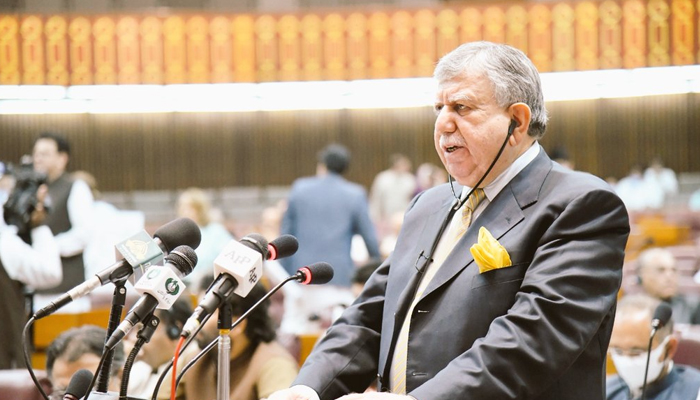
Minister for Finance Shaukat Tarin presents PTI government's third budget.
- Govt sets growth target at 4.8%; total outlay of budget Rs8,478 billion.
- Opposition puts up resistance; attempts to interrupt speech with anti-government slogans.
All eyes were on Parliament as Finance Minister Shaukat Tarin presented the budget 2021-22 on Friday.
The finance minister was greeted by jeers from the Opposition benches, with members shouting slogans and taunting the finance minister by laughing loudly as he praised PM Imran Khan's economic initiatives.
Undeterred and aided by a pair of earphones that allowed him to drown out the ruckus around him, Tarin announced that the total outlay of the budget for the upcoming year had been kept at Rs8,478 billion, with the tax target set at an ambitious Rs5,829 billion.
Key Priorities of the Federal Government for FY 2021-22
During the last three years the government faced several economic challenges, aggravated by the COVID-19 pandemic.
The government has subsequently successfully progressed from recovery and stabilisation to sustainable growth, Tarin said.
The government's priorities henceforth are as follows:
a) Inclusive and sustainable economic growth
b) Pro-poor initiatives and social safety net through the Ehsaas Programme's vertical and horizontal expansion
c) Reduction in inflation and price control and monitoring
d) Increased development spending for more job creation
e) PM's initiatives including Kamyab Jawan and Kissan Programmes
f) Impact mitigation of Covid-19, and the continuation of the Stimulus Package
g) Circular debt financing and power subsidies
h) Revenue mobilization without new taxes
i) Support of the Housing Sector and the Construction Industry through Naya Pakistan Housing Scheme and SME support programs
j) Facilitating expatriates remittances and savings through Roshan Digital Account
k) Pakistan Remittances Initiatives and other schemes
Speaking about the various allocations made by the government, Tarin said Rs480bn had been allotted for pension payments of both civilians and retired military officers.
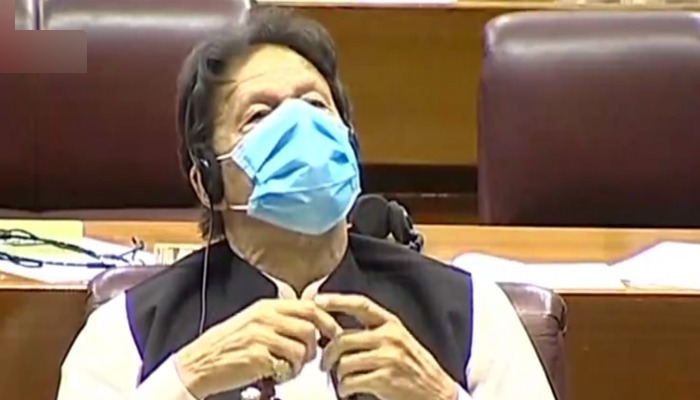
He said the defence budget of the country had been allocated Rs1,370bn while the government had earmarked Rs1,168 for development and non-development grants for provinces.
He said the government had allocated Rs682bn for subsidies to various sectors of the economy, adding that Rs479bn had been allocated to run the civil government.
Tarin said the government was serious in stemming the spread of the coronavirus and keeping its adverse effects at bay, adding that the government had set aside Rs100bn for it.
He said the federal PSDP had been allocated Rs900 billion.
Tarin lashed out at the previous governments, saying that a mountain of circular debt amounting to Rs1 trillion was inherited by the incumbent government due to the botched policies of its predecessor.
"We made the [capacity] payments otherwise the country would have defaulted," he said. "I am presenting you the real picture of the nation and to highlight our performance," added the minister.
Tarin said PM Imran Khan's government does not hesitate from taking difficult decisions. He said the incumbent government had, through its sound economic policies, turned around the current account deficit into a surplus in 2021.
As he spoke, Opposition members continued to bang desks and shouted slogans of "Go Niazi Go!" as the minister spoke.
The minister paid tribute to the PTI government for stemming the spread of the coronavirus pandemic and taking steps to ensure businesses did not suffer massive losses in the country due to the lockdowns.
"The government, through the Ehsaas Emergency Cash Programme, provided cash to 12mn people across the country," he said.
The finance minister announced that the government had set aside Rs260bn for the Ehsaas programme in the budget.
Tarin said remittances had increased in Pakistan to record levels, adding that these are expected to rise to $29bn by the end of this month.
"This is proof of the love that overseas Pakistanis harbour for Prime Minister Imran Khan," he said.
Tarin said the economy had grown and as a result, more people had secured jobs over the years. The finance minister said that despite the coronavirus pandemic, the per capita income of the common man had increased by 15%.
Speaking about tax collection, he said it had grown by 18% and had crossed Rs4,000bn, adding that critics had no response to the government's impressive performance in this regard.
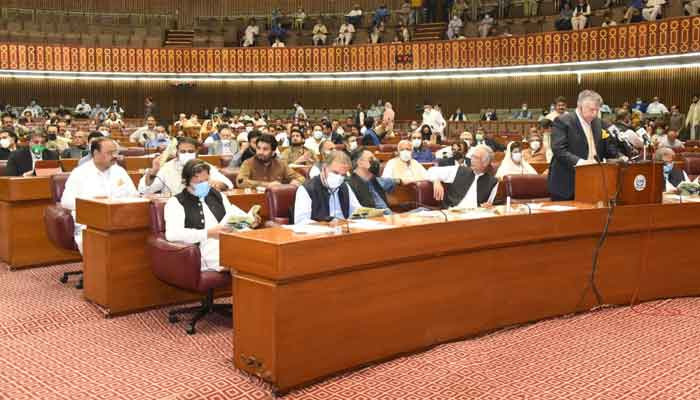
The finance minister announced that the country's economy was now entering the growth period, adding that almost every sector is growing.
He said Pakistan was seeing a "historic growth" in agriculture, stating that apart from cotton, all other crops saw extraordinary increases.
He said that growth in the services sector helped improve numbers pertaining to poverty and had also played a major part in generation of wealth in Pakistan.
Tarin said Pakistan had become a food deficient nation, thanks to the policies of the previous governments. "We will have to become a food sufficient nation and for this, we will have to provide lots of incentives to farmers," he said.
"We will need to bring back administrative controls which were removed during the Musharraf era," he added.
Tarin said the government had kept the growth target at 4.8% for the fiscal year, adding that the government will not leave the poor and the destitute at the mercy of inflation.
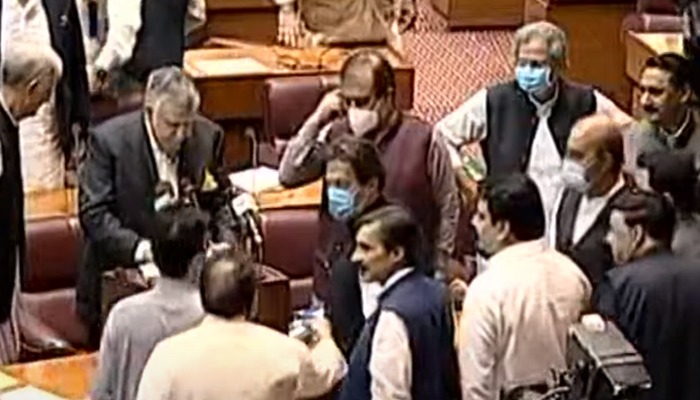
"Never in our economic history, were poor people able to realise their dreams," he said, adding that PM Imran Khan wanted to uplift the poor.
He said the government had decided to provide interest-free loans of up to Rs500,000 to the poor.
Tarin unveils govt’s aggressive 'bottoms-up' approach to transfer ‘real benefits’ to poor
Speaking about the importance of boosting exports so Pakistan can earn foreign exchange, the finance minister said the government was focused on the creation of economic zones to facilitate industries, create jobs and boost exports.
The minister announced that Pakistan has introduced mortgage financing for the first time ever, adding that the passing of the foreclosure law had enabled banks to start lending to people.
He announced that the Public Sector Development Programme will be increased from Rs630 billion to Rs900 billion to counter the adverse impact of the coronavirus pandemic.
The finance minister is interrupted by Speaker Asad Qaiser as he urges Opposition lawmakers to observe silence and the women MNAs in the Parliament to sit down.
"I would request all members to remain in their seats," he said, as the Opposition lawmakers continued to thump their desks and shout slogans against the government.
Tarin announced a development package for 14 districts in Sindh, adding that these will focus on improving education, solving the province's water issues and carrying out development in these districts.
The minister announced that the government has slashed sales tax on locally manufactured cars from 17% to 12.5%. The government has also exempted Federal Excise Duty (FED) on 850cc cars and will slash duty on electric cars.
He announced the government's initiative to earmark $1.1bn to procure coronavirus vaccines, adding that the government aimed to vaccinate 100mn people by July 2022.
Tarin said the government was introducing third-party audits which would thwart the FBR harassing any individual or business entity. He said those who are found guilty of evading taxes or deliberately hiding their income will be fined severely.
"The rich will be asked to pay taxes in accordance with their wealth," he said, adding that the salaries class will not be burdened with additional taxes.
The finance minister said the track-and-trace systems will be strengthened so that undocumented trade does not flourish in the country.
Tarin said the government was slashing withholding taxes on mobile phones, adding that it will be reduced to 10% at first and then 8% later.
He said the government was intent on eliminating the menace of corruption, adding that Pakistan Customs was focused on curbing sale of illegal trade.
"The western borders of the country and the coastal strips should be made safe so that these practices end," he said.
The National Assembly session has been adjourned to meet again on Monday, June 14, at 4pm.
Tarin presents Economic Survey 2021
Presenting the Economic Survey of Pakistan 2021 yesterday, Finance Minister Shaukat Tarin had said the government plans to boost agriculture as Pakistan was now heading towards a direction which would enable it to become a food exporter, as opposed to a net food importer, which it had become now.
To achieve this, the finance minister revealed that the government had planned to introduce commodity warehousing and cold storages to diminish the role of the middlemen. In this way, he said, the government will be able to put a check on profiteering and be able to build strategic reserves to counter speculative and market fixing behaviours.
The minister had stressed on the importance of sustainable growth, saying that the country’s burgeoning young population needed two million jobs per year, and without growth, it was impossible to create employment on such a massive scale.
Tarin had stressed that unfortunately commercial banks do not lend to the poor in Pakistan. He said due to this, wealth was not being redistributed in Pakistan which was crushing the poor under financial burden.
The finance minister said since had profound knowledge of the country’s banking system, he will use that experience to show commercial banks how to provide loans to the bottom 4-6mn people in the country and help them realise their dreams.
Speaking about the importance of the small-and-medium enterprises (SMEs), Tarin said it was unfortunate they were provided only 6% of the banking credit. In Budget 2021-22, he promised to prioritise funding for SMEs as well.
“Exports, exports, exports,” the finance minister had stressed yesterday, saying that Pakistan will provide incentives to enhance not only its traditional but also non-traditional exports. We have to earn dollars and until we do so, how can we repay back our debt?” he had asked.





